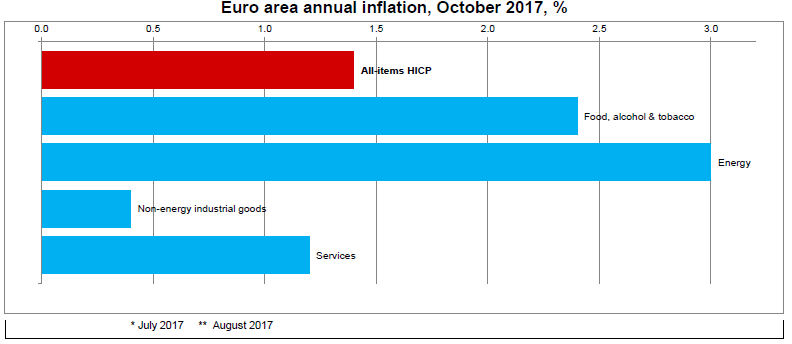Harold James, (2017), “Europe’s Hard-Core Problem”, Project Syndicate, 1 November With populism endemic in its periphery, the European Union is clearly in a period of deep uncertainty. If EU leaders are ever going to right the ship, they will need to identify the root cause of today’s instability, which is not so much about economics or immigration as it is about de facto Franco-German leadership. Relevant Posts Dustmann, Christian, Eichengreen, …Read More
GDP up by 0.6% in both the euro area and the EU28
Eurostat/GDP up by 0.6% in both the euro area and the EU28/31 October, 2017 Seasonally adjusted GDP rose by 0.6% in both the euro area (EA19) and in the EU28 during the third quarter of 2017, compared with the previous quarter, according to a preliminary flash estimate published by Eurostat, the statistical office of the European Union. In the second quarter of 2017, GDP had grown by 0.7% in both zones. Relevant Posts …Read More
Euro area annual inflation down to 1.4%
Eurostat/Euro area annual inflation down to 1.4%/31 Οctober 2017 Euro area annual inflation is expected to be 1.4% in October 2017, down from 1.5% in September 2017, according to a flash estimate from Eurostat, the statistical office of the European Union.Looking at the main components of euro area inflation, energy is expected to have the highest annual rate in October (3.0%, compared with 3.9% in September), followed by food, alcohol & tobacco …Read More
September 2017, Euro area unemployment at 8.9% – EU28 at 7.5%
Eurostat/September 2017,Euro area unemployment at 8.9%-EU28 at 7.5%/31 October 2017 The euro area (EA19) seasonally-adjusted unemployment rate was 8.9% in September 2017, down from 9.0% in August 2017 and from 9.9% in September 2016. This is the lowest rate recorded in the euro area since January 2009. The EU28 unemployment rate was 7.5% in September 2017, stable compared to August 2017 and down from 8.4% in September 2016. This remains the lowest rate …Read More
Creating Long-Term Value in Europe’s Capital Markets: Opportunities and constraints
Amariei, C. (2017), “Creating Long-Term Value in Europe’s Capital Markets: Opportunities and constraints”, 1st Interim Report of the CEPS-ECMI Task Force on Asset Allocation in Europe, Brussels, 30 October Many factors – changing economic/financial conditions, evolving demographics and regulatory as well as technological developments – will impact asset allocation in the coming years. In anticipation of these changes, the Mid-Term Review of the Capital Markets Union (CMU) Action Plan set out …Read More
Behavioural economics is also useful in macroeconomics
Paul De Grauwe, Yuemei Ji, (2017), “Behavioural economics is also useful in macroeconomics”, VoxEU, 1 November Behavioural economics is seeing increased acceptance as a legitimate way of thinking about economic issues. The recent awarding of the Nobel Prize to Richard Thaler testifies that there has been a change of view within the economics profession on the need to allow for departures from the paradigm of the ‘homo economicus’. Relevant Posts …Read More
Rethinking Working Time In Europe
Jorge Cabrita, (2017), “Rethinking Working Time In Europe”, Social Europe, 1 Νοεμβρίου The results of recent Eurofound research on working time patterns in the EU constitute a strong plea for working time policies that clearly acknowledge the life course perspective. This means that working time must not only be thought and organised in daily, weekly, monthly and/or yearly terms but also take into full consideration the different stages of our …Read More
Europe’s Economic Dilemma
Martin Feldstein, (2017), “Europe’s Economic Dilemma”, The Project Syndicate, 30 October The European Central Bank deserves credit for the economic improvements that have occurred in the past few years. But the ECB’s policies also mean that the eurozone has no ammunition left to fight the next recession, because interest rates cannot be reduced further and fiscal policy remains in the hands of national governments. Relevant Posts Jean Tirole, (2017), «The European …Read More
Europe Is Doing So Well Even Politics Can’t Drag It Down
Viktoria Dendrinou, (2017), “Europe Is Doing So Well Even Politics Can’t Drag It Down”, Bloomberg, 31 Οctober Even as economic confidence in the euro area reaches historic highs, a series of political risks simmering across the European Union still threaten to undermine the bloc’s fragile recovery.The euro-area economy, aided by more than 2 trillion euros ($2.3 trillion) of bond purchases by the European Central Bank, has been gathering pace with …Read More
The European Project Needs a New Long-Term Vision
Jean Tirole, (2017), “The European Project Needs a New Long-Term Vision”, Bloomberg View, 30 October The euro area has two main options: the current strategy of improving the Maastricht Treaty, designed to ensure the fiscal discipline required for many states to share a currency; or a more ambitious move toward federalism, which would require greater risk sharing among member states. Neither is compatible with the desire for more sovereignty. This …Read More







